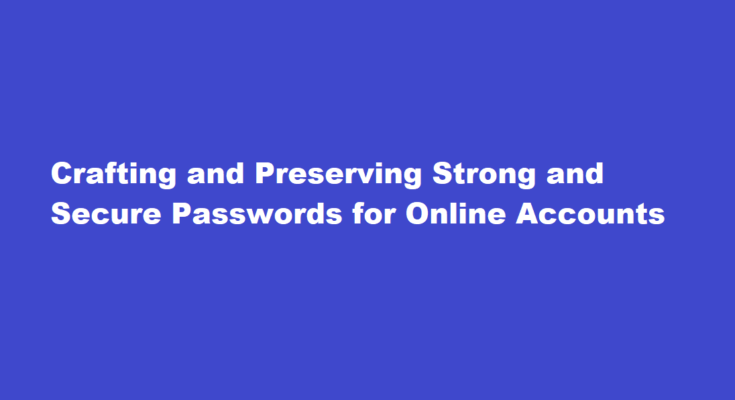In this digital era, safeguarding our online accounts has become more critical than ever. With cyber threats on the rise, creating and maintaining strong, unique passwords is the first line of defense against unauthorized access and potential data breaches. In this article, we will explore the key principles of crafting robust passwords and adopting good practices to ensure the security of our online identities.
Complexity and Length
The foundation of a secure password lies in its complexity and length. A strong password should contain a combination of uppercase and lowercase letters, numbers, and special characters. Aim for a minimum of 12 characters; the longer, the better. Steer clear of easily guessable information, such as birth dates, names, or common words found in the dictionary. Instead, consider creating memorable phrases or sentences and incorporating their initials or special characters into the mix.
Unique Passwords for Each Account
Using the same password for multiple accounts is a dangerous habit that exposes all of your online profiles if one of them gets compromised. Therefore, it is crucial to use unique passwords for every platform you register on. Managing multiple passwords can be challenging, but password managers can be an invaluable tool to securely store and organize all your login credentials.
Regularly Change Passwords
While it was once a popular practice to change passwords frequently, the current consensus among cybersecurity experts is that changing passwords too often can lead to weaker passwords being used. Instead, opt for a more practical approach: change passwords only if you suspect a breach or if a particular account has not been accessed for a long time. Regular monitoring of your accounts and prompt action in case of suspicious activities is more effective in ensuring security.
Multi-Factor Authentication (MFA)
Take advantage of multi-factor authentication whenever possible. MFA adds an extra layer of protection by requiring additional verification beyond your password. This may involve using a one-time code sent to your phone or email, a fingerprint scan, or a hardware token. It significantly reduces the risk of unauthorized access, even if someone manages to obtain your password.
Avoid Phishing Attempts
No matter how strong your password is, falling victim to phishing attacks can undermine all your security efforts. Phishing is a deceptive technique used by hackers to trick users into revealing their login credentials unknowingly. Be cautious of unsolicited emails, messages, or links that ask for personal information. Always verify the authenticity of the website or sender before sharing any sensitive data.
Stay Informed and Update Regularly
Stay informed about the latest security practices and threats in the digital landscape. Cybersecurity is an ever-evolving field, and hackers continuously find new ways to exploit vulnerabilities. Regularly update your passwords and security settings to adapt to emerging threats.
Be Wary of Public Wi-Fi
Public Wi-Fi networks are notorious for their lack of security. When using public Wi-Fi, refrain from accessing sensitive accounts or making financial transactions, as these networks are prime targets for hackers looking to intercept data. Use a Virtual Private Network (VPN) to encrypt your internet connection and add an extra layer of protection.
Don’t Store Passwords in Browser
Modern web browsers offer to save passwords for convenience, but this convenience comes at the cost of security. Avoid storing passwords in your browser, as they are more susceptible to unauthorized access. Instead, rely on a reputable password manager that employs strong encryption to keep your credentials safe.
FREQUENTLY ASKED QUESTIONS
Which password would be best for online accounts?
Use a mix of alphabetical and numeric, a mixture of upper and lowercase, and special characters when creating your unique passphrase. Use unique passwords or passphrases: You should have a unique password for each of your accounts. This way, if one of your accounts is compromised, your other accounts remain secure.
What makes a secure online password?
A combination of uppercase letters, lowercase letters, numbers, and symbols. Not a word that can be found in a dictionary or the name of a person, character, product, or organization. Significantly different from your previous passwords. Easy for you to remember but difficult for others to guess.
In conclusion
The responsibility of safeguarding our online accounts falls upon us, and it begins with creating and maintaining strong and secure passwords. A combination of complexity, uniqueness, and length is essential in crafting robust passwords. Additionally, adopting good practices such as multi-factor authentication, staying informed about cyber threats, and avoiding phishing attempts are vital to ensure the security of our digital identities. By taking these proactive measures, we can confidently navigate the online world with reduced risk and heightened peace of mind.
Read Also : Navigating Networking Events for Career Growth and Opportunities



